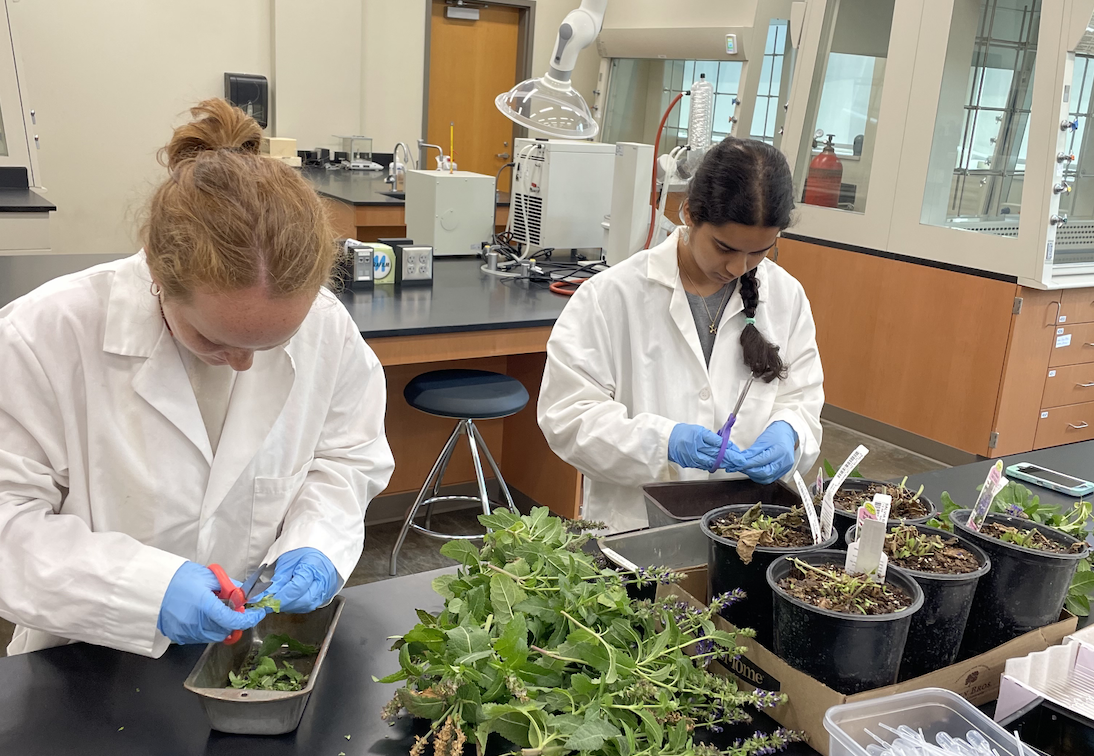The STEM research students at Gustavus study many things that aren’t easily described in plain English, but two first-year scholars this summer have been experimenting with compounds to see if they can solve a problem anyone can understand: curing cancer.
Gabby Stoudt ’26 and Zoya Akhtar ’26 worked with Visiting Assistant Professor in Chemistry Kennedy Nyongbela on a project that took components from Minnesota sage and wild plum plants and examined their effects on glioblastoma (GBM), an aggressive type of brain tumor. Nyongbela has been focused on this illness since his mother’s death from GBM a couple of years ago, and he wanted to zero in on natural products. “The strategy I am using in my drug discovery efforts is to look at the things that we eat because if we already eat them, we should have less toxicity and side effects when we take medicines made from them,” he said.
Stoudt had already done some preliminary research on the project with Nyongbela during this past J-term, and when she landed a Johnson-Peterson Summer Research Fellowship, she knew she wanted to continue the work. Meanwhile, Akhtar was accepted into the First-Year Research Experience (FYRE) Program, and although faculty sabbaticals and absences meant there weren’t as many research opportunities available this summer in her chosen fields, math and psychology, the project itself appealed to her. “This one seemed super interesting because it was working with cancer cells and using natural products to combat those cells,” she said. “The purpose of this summer for me was to just participate in some sort of research program my first year and expand my opportunities from there.”

Part of the project involved spending two weeks at the University of Minnesota, where Stoudt and Akhtar got to work with and be mentored by graduate-level researchers and their faculty, something Nyongbela called a “huge learning curve” for the Gusties. They also sat in on dissertation presentations and got a feel for the graduate and professional research world.
The results of this work have been productive enough that Nyongbela will now begin applying for grants that will enable them to build upon what they’ve learned so far. Among these possible financial awards is an R15 grant, funding from the National Institutes of Health that provides time, money, and a certain level of autonomy for promising research proposals. They also may present their findings at academic conferences this coming year.
Stoudt is especially motivated to continue the work, as it’s directly related to her majors of Biochemistry and Molecular Biology. (She also double-majors in Art.) “Even though we don’t yet know what the specific targets are of the plant components on cancer cells, it’s exciting to see that what we predicted actually had some impact,” she said. “It’s an amazing educational experience to be in a graduate-level research lab as a freshman. So many people our age would not be given these opportunities right now.”
Nyongbela lauded the students for their accomplishments and maturity in conducting the summerlong project and looks forward to continuing to explore its possibilities. “I could see the way they handled things as their confidence grew in the lab and with their writing,” he said. “I always want my students to take responsibility for their work. I sometimes allow them to go hit their head on the wall and make mistakes, and then I’ll come in and help fix things, and then they get better and better, and we are good to go. Every research project is a story you’re telling, with a beginning, a middle, and an end. And right now we’re still in the middle.”

Leave a Reply